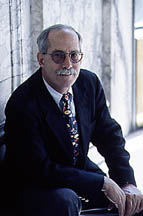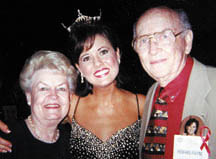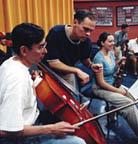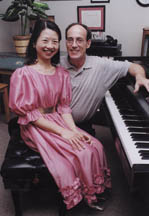|
Head of the class
New Education Dean Samuel
Deitz says no school is an island -- or at least
shouldn't be.

 An
avid gardner, Samuel Deitz knows what it takes to grow flowers and vegetables
in Georgia. He admits he'll have to learn how to make those same plants
thrive in Texas. An
avid gardner, Samuel Deitz knows what it takes to grow flowers and vegetables
in Georgia. He admits he'll have to learn how to make those same plants
thrive in Texas.
But after
spending 29 years at Georgia State University and the last decade as its
education dean, Deitz does know what it takes to grow good teachers.
"There
are sets of expertise in other colleges that are not represented in the
School of Education, nor should they be," said the 55-year-old Deitz.
"The schools of arts and sciences and others have content, and we
have the teaching skills. We have to work together to produce a teacher."
An expert
in behavioral analysis and education, Deitz developed a program at GSU
that takes students from the law and education colleges into the local
school district to teach conflict resolution, the type of collaboration
he plans to initiate here.
"We
need to have lots of our students in the public schools, tutoring students,"
he said. "A school of education has to be partnered with the local
schools, not only to help them improve their schools but to help them
prepare our students for what they need. "An education student might
be taking math classes, but when they get to the classroom, they sometimes
haven't learned what the schools need them to know. The public schools
can tell us that."
Partnering
with the business college is also high on his list. Many skills taught
in business are desperately needed by teachers, especially those who go
on to become administrators.
"If
you look, most communities are trying to get businesses involved in schools,
but they don't know what to do," he said. "If we could have
a partnership between business and education, we could find ways business
could get involved in the community that would be helpful."
Just like
figuring out the Texas soil, Deitz said he will be looking for new and
innovative ways to make TCU's education helm bud and bloom.
"That's
going to be one of my pushes, to get the School of Ed to look at things
in a different way," he said. "Not to say, 'This is how we've
always done it,' but to say, 'How can we do it that's really skipping
over old thinking?' "
*****
Samuel M.
Deitz Dean, School of Education Deitz and wife Tricia, a homemaker, put
family activities with their three kids -- Jacob, Celia and Joshua -- as a top
priority. But with two kids now in college, he'll probably have more time
for golfing, another favorite hobby.
Education:
BAE University of Florida, English and education, 1966
MAE University of Florida, educational psychology, 1969
PhD University of Florida, educational psychology, 1971
Professional:
During his 29-year tenure at GSU, the College of Education saw increases
in both external funding and student enrollment. As dean, Deitz formed
vital partnerships with disciplines across campus, resulting in programs
that impacted the business community, the university and public schools
in Georgia.
"I hope
to create innovative partnerships to complement the work already under
way at TCU in urban education and math, science and technology education,
to improve the quality of teachers for our schools. I am confident the
faculty is ready to reach for and grasp a new level of national distinction."

Math
+ science = fun
With
a $240,000 grant, TCU's School of Ed is teaming up with campus departments,
community to explore better ways to teach youngsters.
 Richland
High School sophomore Katy Albury wanted to be a pilot someday. But after
a week-long Introduction to Fabrication engineering camp in June, "I've
got to rethink all of that," said Albury, her workspace and clothing
littered with tiny metal shavings from a metal lathe drilling project.
"It
has been very exciting." Richland
High School sophomore Katy Albury wanted to be a pilot someday. But after
a week-long Introduction to Fabrication engineering camp in June, "I've
got to rethink all of that," said Albury, her workspace and clothing
littered with tiny metal shavings from a metal lathe drilling project.
"It
has been very exciting."
Albury
was one of seven Fort Worth-area high school students who participated
in the project led by TCU's Institute of Math, Science and Technology
Education and funded by a $260,000 Sid Richardson Foundation grant, which
will bring an increasing number of camps and workshops to campus.
"In students nationwide, we see that the interest in math and science
begins to wane after the third grade, and we really lose them in middle
school and high school," said Education Assistant Prof. Janet Kelly.
"Our goal is to help the teaching of math and science in grades K
through 12; we want to show that science and math can be interesting and
can go beyond just memorizing formulas and facts."
One
look into the Winton-Scott lab where the engineering camp spent much of
its time proves Kelly's point. Taught by engineering professors Bob Bittle,
Becky Bittle and Stephen Weis, students constructed circuit boards that
were able to switch a light on and off with a simple touch and measured
and drilled and tapped aluminum slabs to produce seemingly simple screw
holes needed to attach almost anything in today's devices.
"We
showed the students what goes into bringing a product to market,"
the professor Weis said. "They have CD players and other things that
they have no idea what goes into making them; we wanted to give them a
taste of what's involved. While I think this is a good way to recruit
new students, we also wanted to do the camp as a way to get involved with
kids in our community."
The
Institute is also working closely with the Fort Worth Museum of Science
and History, the Fort Worth Zoo, the Botanical Research Institute of Texas
and numerous public and private schools, including the Fort Worth Independent
School District and four other neighboring ISDs.
Kelly
and Biology Prof. Ray Drenner also led a workshop addressing individual
teacher needs in the classroom; the engineering faculty conducted a similar
workshop. And this fall, approximately 300-400 elementary students will
be selected by area teachers to participate in a math and science "mini-university,"
with TCU pre-service teachers assisting lead teachers.
"That's
what this is all about," Kelly said, "building partnerships
and finding ways together to improve math and science education."

City
beat
TCU's
Urban Journalism Workshop continues a 22-year tradition.
 In
the Spring of 1999, a local high school held its annual cheerleading tryouts
for the upcoming school year. Fifteen girls made the squad. A few months
later, five became pregnant -- despite sexual education, the threat of
AIDS and ads urging teens to use protection. In
the Spring of 1999, a local high school held its annual cheerleading tryouts
for the upcoming school year. Fifteen girls made the squad. A few months
later, five became pregnant -- despite sexual education, the threat of
AIDS and ads urging teens to use protection.
So
opens the lead story in Minority Mind, an eight-page newspaper produced
by high school students attending the TCU Urban Journalism Workshop in
June.
Sponsored
by Dow Jones, Inc., the Fort Worth Star-Telegram and the Dallas
Morning News, the 22-year-old program is designed to give minority
students a chance to see how the process works.
Various
professionals contributed during the workshop, including a reporter from
the Star-Telegram whose assignment for the two weeks was helping at the
workshop. By the end of the two-week workshop, said Assistant Prof. Earnest
Perry, the eight students gathered, wrote, edited, designed and printed
a newspaper issue tackling teen pregnancy, TCU girls basketball camp,
popular fashion, movie and music reviews, even an opinion piece about
the lack of Latin American representation on prime-time television.
"This gives ethnic minorities a chance to be on a college campus
and see what the possibilities really are," Perry said. "This
gets them thinking about getting a degree or furthering a career they
wouldn't have thought about otherwise."

 Miss
Texas. Speech pathology senior Tara Watson was befriended at Frog
Camp four years ago by Howard and Mildred Payne, unofficial "parents"
for many students. Naturally, the two were on hand in July when Watson
won the Miss Texas pageant, her fourth try for the top prize. As many
as five other TCU alumni and students competed, including political science
senior Marshawn Evans, a Truman scholar and lead TCU band twirler. Miss
Texas. Speech pathology senior Tara Watson was befriended at Frog
Camp four years ago by Howard and Mildred Payne, unofficial "parents"
for many students. Naturally, the two were on hand in July when Watson
won the Miss Texas pageant, her fourth try for the top prize. As many
as five other TCU alumni and students competed, including political science
senior Marshawn Evans, a Truman scholar and lead TCU band twirler.

 Art
imitates life. Imagine a flurry of little feet shuffling below large,
painted posies. Then trees and bushes saunter out, concealing their taller
-- and older -- creators. Finally, two 15-foot jungle beasts perched on
spindly sticks battle on a TCU stage as the narrator explains the scene,
based on a Henri Rousseau painting. The "living painting" marked
the final artistic endeavor for the kids involved in this summer's Art
Camp. About 250 students participated in three sessions, including Jeffrey
Regan, left; since 1987, elementary and middle school students have flocked
to the Moudy building for the opportunity to paint, draw and sculpt. "This
brings together young people into a community of artists and gives them
a chance to improve their skills," Art Education Coordinator Terri
Cummings said. "It is a historic tradition in art and art making
that artists give back to that community by helping the younger artists
coming up." Art
imitates life. Imagine a flurry of little feet shuffling below large,
painted posies. Then trees and bushes saunter out, concealing their taller
-- and older -- creators. Finally, two 15-foot jungle beasts perched on
spindly sticks battle on a TCU stage as the narrator explains the scene,
based on a Henri Rousseau painting. The "living painting" marked
the final artistic endeavor for the kids involved in this summer's Art
Camp. About 250 students participated in three sessions, including Jeffrey
Regan, left; since 1987, elementary and middle school students have flocked
to the Moudy building for the opportunity to paint, draw and sculpt. "This
brings together young people into a community of artists and gives them
a chance to improve their skills," Art Education Coordinator Terri
Cummings said. "It is a historic tradition in art and art making
that artists give back to that community by helping the younger artists
coming up."

 The
god of wisdom (and maybe music). Spearheaded by TCU violinist Curt
Thompson, the third annual Mimir Chamber Music Festival drew six musicians
from top orchestras around the world to serve as guest artists and faculty
members for a week to some 20 student musicians chosen from across the
country. Grammy Award nominee and clarinetist Martin Frost and his brother,
pianist Johann Frost, traveled from Sweden to represent the musical traditions
of Sweden, from whence the festival's name was drawn -- Mimir was the
Norse god of wisdom. The
god of wisdom (and maybe music). Spearheaded by TCU violinist Curt
Thompson, the third annual Mimir Chamber Music Festival drew six musicians
from top orchestras around the world to serve as guest artists and faculty
members for a week to some 20 student musicians chosen from across the
country. Grammy Award nominee and clarinetist Martin Frost and his brother,
pianist Johann Frost, traveled from Sweden to represent the musical traditions
of Sweden, from whence the festival's name was drawn -- Mimir was the
Norse god of wisdom.

 Striking
a chord. Two contestants at this summer's International Van Cliburn
Amateurs Competition found a prize more valuable than a gold medal; glass
installer Greg Fisher, right, of Oklahoma and pediatric cardiologist Miho
Yamada of Japan found love. The two met at last year's competition and
married last fall. They returned for the 2000 competition, with Yamada-Fisher
reaching the second round this June. The Cliburn amateurs event is tuned
for pianists above the age of 35 who have pursued any career other than
piano performance. Attorneys, homemakers, computer specialists, a massage
therapist, an astrologer and a six-time Emmy award-winning news producer
were among this year's 81 contestants. The big winner this year was Christopher
Basso, a Starbucks assistant store manager from New York. Striking
a chord. Two contestants at this summer's International Van Cliburn
Amateurs Competition found a prize more valuable than a gold medal; glass
installer Greg Fisher, right, of Oklahoma and pediatric cardiologist Miho
Yamada of Japan found love. The two met at last year's competition and
married last fall. They returned for the 2000 competition, with Yamada-Fisher
reaching the second round this June. The Cliburn amateurs event is tuned
for pianists above the age of 35 who have pursued any career other than
piano performance. Attorneys, homemakers, computer specialists, a massage
therapist, an astrologer and a six-time Emmy award-winning news producer
were among this year's 81 contestants. The big winner this year was Christopher
Basso, a Starbucks assistant store manager from New York.

TCU
Tomes -- Lili Kraus: Hungarian Pianist, Texas Teacher, Peronality
Extraordinaire
In
this TCU Press gem, Steve Roberson '75 (MM), associate dean of the Jordan
College of Fine Arts at Butler University, paints a candid, detailed account
of acclaimed pianist Lili Kraus. A student of the virtuoso from 1972-75,
Roberson admits early on to being infatuated with his former teacher's
talent and poise, but still manages an objective account. For those interested
in Kraus as performer as well as teacher, this is a book not to be missed.
"There is a superstition that the less pedal used in Mozart, the
better," Kraus said in 1972, Roberson records. "This is nonsense;
it fits in with the distorted picture of Mozart as a pretty Rococo composer
in silk breeches and powdered wig. I prefer Mozart in riding pants and
boots!"

In
brief:
Appointments.
Marquette University Admissions Dean Ray Brown called his decision to
become TCU's dean in charge of student recruitment "plain smart for my
family and me; I'm joining a university that is in the process of moving
to the next level of distinction and has the substance to make it happen."
Brown, who began his position Aug. 1, replaced Admissions Dean Sandra
Ware, who retired this summer. Prior to joining Marquette in 1993, Brown
served as associate dean of students and director of admissions at the
University of Chicago's Graduate School of Business and director of admissions
at Lawrence University in Appleton, Wis. He grew up in Mineral Wells,
60 miles west of Fort Worth. Brown and his wife Lisa have three children:
Sarah, 16, Matthew, 10, and Zachary, 8.
TCU
also welcomed a new director of athletics media relations, Steve Fink,
who left behind a 13-year career with the Kansas City Royals. "I've been
impressed with the administration and its vision and commitment to the
future of TCU athletics," he said. "It's a great time to be a Horned Frog."
During his tenure with the Royals, Fink served as the primary media contact.
Fink and his wife Charlene have a daughter, Lauren, 9, and a son, Ryan,
6.
The
future is coming. Last year, some 450 alumni, campus and professional
leaders came together to form the Commission on the Future of TCU. Chaired
by well-known CBS newsman Bob Schieffer '59 and directed by Vice Chancellor
Larry Lauer, the group formed 17 different task forces examining all areas
of the university, from technology to undergraduate and graduate education
to athletics. On Oct. 9, the Commission will present its full report,
breaking down hundreds of recommendations into "action categories" ranging
from urgent to long-term. (The Commission recommendations will appear
in the Winter issue of the magazine.)
A few good entrepreneurs. The James A. Ryffel Entrepreneurship
Center has announced an "entrepreneurial summit" for April 6-7. In addition,
said Director David Minor '81, the center hopes to identify everyone in
the TCU community who has ever operated his or her own business. The results
of the search will be a networking and information database. Former or
current business owners can call the center office at (817) 257-5608 or
e-mail Minor at d.minor@tcu.edu.
Two
new master's. Think global implications, and you'll have a good idea
of what TCU's journalism department has in mind for its new graduate degree
being offered this fall, said Journalism Graduate Programs Director Doug
Newsom. "Reporting
becomes a knee-jerk reaction for most news writers," she said. "Our new
program will help them think of all the ethical implications that go into
news that spreads globally almost instantly."
A second new degree this fall, media arts, will educate students interested
in broadcast media, providing a versatile background in production, analyses
and the industry, said Roger Cooper, chair of the Radio-TV-Film department.
"Technology
is changing so fast that it's hard to know what sort of jobs will even
be out there in a few years," Cooper said. "This program is based on the
idea that success in media is based on a well-rounded knowledge of the
media."

Top
|



